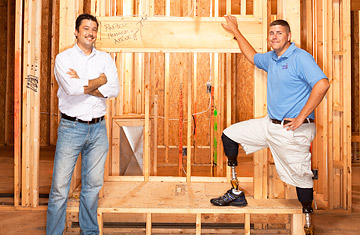
John Gallina and Dale Beatty were best friends.
They joined the North Carolina National Guard while they were still in high school. They served in Iraq together, and they nearly died together on Nov. 15, 2004, when their humvee was blown up by an antitank mine. Beatty, a staff sergeant, was riding shotgun; Gallina, a specialist, was driving. The humvee flew 200 ft. (60 m) through the air and landed upside down. Beatty realized he was trapped, crushed, the only one still inside. Gallina had been thrown from the vehicle and was out cold. When he came to 45 minutes later, his first question was, Where's Dale? No one would tell him; he figured Beatty was dead.
He later learned that Beatty had been medevacked to Balad and then on to Walter Reed Medical Center, where his left leg was amputated just below the knee. "I woke up in Walter Reed," Beatty recalled. "And they gave me a choice: I could spend the next two years in therapy, trying to save my other leg — but I'd never walk without pain again — or they could amputate it. I told them to cut it off the same place they'd cut the other one."
Beatty's wounds were obvious; Gallina's, less so. "When I wear shorts, it gets people's attention," Beatty told me recently. "People are more aware of me than of John. He just got off the airplane and was out of the National Guard, with not much support." Gallina had suffered a traumatic brain injury, multiple cuts and bruises, a damaged back and severe posttraumatic stress disorder.
The local homebuilders association in Statesville, N.C., offered to build Beatty a house on his family's land. It wasn't a fancy house, but it was designed with a double amputee in mind. Beatty helped build it, and he found that the days he spent hammering nails were better than the days he didn't. He called Gallina and asked him to join in — and Gallina, who had a background in construction, experienced a tremendous satisfaction, a sense of peace, building the home. When the construction was done, their next step seemed obvious. "We were trained in the military never to leave a fallen comrade in the field," Gallina says. "But do we bring them home just to leave them alone? That didn't seem right."
The two men decided to form an organization to do handicapped-access projects for other veterans. They called it Purple Heart Homes. Their first project was to build an extension and wheelchair ramp for a Vietnam veteran named Kevin Smith. "He had been crawling in and out of the house for 40 years, relying on the help of a neighbor to go shopping," Gallina says. "Those Vietnam guys represent around 32% of all veterans, and they didn't get anything like the support we get. You know, for someone like me to have something to focus on, to have a reason to be here, makes all the difference, and there are so many people who need help."
The story of purple heart homes is extraordinary but not unique. It may not even be unusual, even though most of the news we seem to hear about the veterans coming home from Iraq and Afghanistan is pretty bad. It is all about suicides, domestic violence and posttraumatic stress disorder. It is about veterans who are jobless and homeless. All of which is true, but there is another side of their story that has not been told: the veterans like John Gallina and Dale Beatty, who have come back and decided to continue to serve their country. They are a tiny proportion of the population, and probably a small proportion of returning veterans, but they are beginning to make a real difference. A pair of Marine sergeants named Jake Wood and William McNulty started Team Rubicon, which sends elite teams of former noncoms to organize logistics in areas like Haiti after the earthquake and Joplin, Mo., after the tornado. An Army captain named Wes Moore has started a mentoring program for first-time offenders between the ages of 8 and 12 in Baltimore and travels the country giving motivational speeches to high school kids. A Silver Star recipient and former Marine captain named Brian Stann has become an ultimate-fighting champion and, in his spare time, runs an employment agency for veterans. Iraq and Afghanistan war vets have gone to work in other parts of the government, like the State Department, where they're having a major impact on the field-level conduct of foreign-aid programs. Some are running for office, as Republicans and as Democrats; others are getting graduate degrees at places like Yale Law School and Harvard's Kennedy School of Government and will likely enter politics or public service before long. "They're incredible, some of my best students," says Dr. Elaine Kamarck of the Kennedy School. "Two things set them apart: they've very disciplined, and they're really, really serious about their work."
